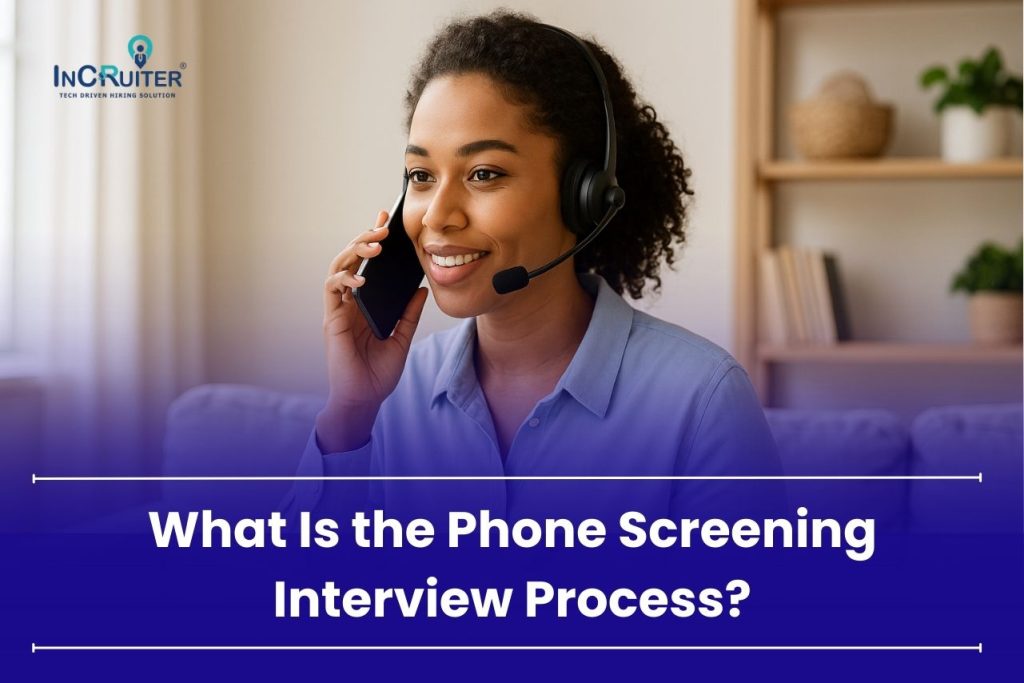
A recruiter picks up the phone, hoping the next candidate picks up. Earlier that day, three no-shows, one mismatch, and a resume that looked great but turned out to be copied. Another panelist just cancelled at the last minute. These are not just rare cases; this is the day hustle of the talent acquisition team. This is why the phone screening process comes in to streamline this time-wasting process.
It helps recruiters save time, avoid bad fits early, and create a structured entry point into the interview pipeline. In this blog, we explain what the phone screening interview process is and how to manage it effectively.
Understanding the Phone Screening Interview
A phone screening interview is like the first handshake between a company and a job candidate, but over the phone. It’s usually a quick 15 – 30 minute conversation where the evaluator checks if the candidate meets the basic job requirements before moving them to the next interview round.
Think of it as a filter instead of interviewing 100 applicants in-depth, recruiters first use this call to understand who’s genuinely a match. They ask about the candidate’s experience, notice period, salary expectations, and communication style. It saves time for both sides and ensures only the right people move forward.
Step-by-Step Process of Phone Screening Process
1. Job Role Preparation
The interviewer team begins by carefully reviewing the job description. This helps them identify what skills and qualifications are absolutely required and which ones are simply preferred. Creating a checklist with two clear categories gives structure to the screening process. Without this step, the recruiter risks wasting time on candidates who are not aligned with the role.
2. Shortlisting Resumes
Resumes are filtered using either an applicant tracking system or a manual scan. The recruiter looks beyond flashy formatting and focuses on relevance to the role. Candidates are prioritized based on their experience, education, and how closely they match the job requirements. This step reduces the pool to a manageable number worth contacting.
3. Scheduling the Call
The recruiter sends a polite message or email to the shortlisted candidates asking for a convenient time to talk. If a scheduling tool is available, it simplifies the process and avoids the need for multiple follow-ups. Setting up calls in a professional and respectful way makes a strong impression on potential hires.
4. Conducting the Call
The talent acquisition team starts the call by introducing themselves, discussing the company, and briefly explaining the job role. Then they move on to structured questions covering past experience, availability, and salary expectations. Throughout the call, they observe how clearly the candidate communicates. This is often the first chance to judge confidence, tone, and intent in real time.
5. Note-taking and Evaluation
While on the call, the recruiter takes notes using a spreadsheet. Essential points are captured clearly, and the candidate is rated using a simple scoring system. Based on the conversation, the recruiter labels the profile as yes, no, or maybe. This makes later decision-making faster and more accurate.
6. Communicating Next Steps
At the end of the call, the recruiter informs the candidate about what comes next and when to expect a response. After the call, candidates receive follow-up emails confirming whether they have been shortlisted or not. Keeping candidates informed builds trust and reflects positively on the company’s hiring culture.
Also Read: Using Al Recruiter to Automate Phone Screening Process
CONCLUSION
The phone screening process plays a vital role in shaping the success of any recruitment effort. It allows recruiters to quickly filter candidates who meet the basic requirements and are genuinely interested in the role. With proper planning, structured conversations, and clear follow-ups, phone screening helps save time and improve decision-making. It also offers candidates a smooth and respectful experience early in the hiring journey. For companies aiming to hire smarter and faster, mastering this process is a practical step toward better talent selection.
Want to streamline your phone screening interviews? Try InCruiter full-stack hiring suite to automate, evaluate, and hire better.
Ready to Transform Your Hiring Process?
Discover how our AI-powered interview platform can streamline your recruitment and find the best candidates faster.






